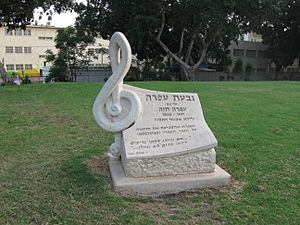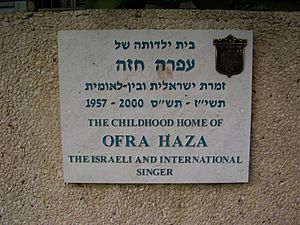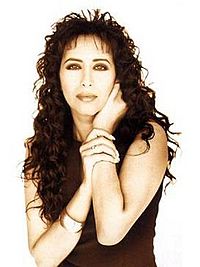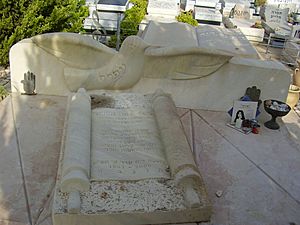Ofra Haza facts for kids
Quick facts for kids
Ofra Haza
|
|
|---|---|
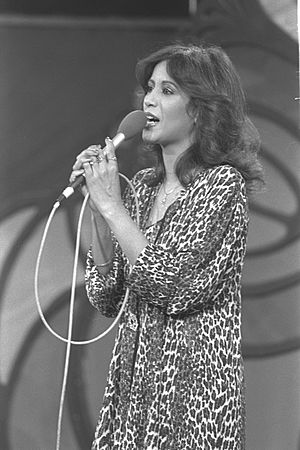
Haza in 1981
|
|
| Born |
Bat-Sheva Ofra Haza
19 November 1957 |
| Died | 23 February 2000 (aged 42) |
| Cause of death | Complications from AIDS |
| Resting place | Yarkon Cemetery |
| Occupation |
|
| Years active | 1969–2000 |
| Spouse(s) |
Doron Ashkenazi
(m. 1997) |
| Musical career | |
| Genres | |
| Instruments |
|
| Labels |
|
Bat-Sheva Ofra Haza (Hebrew: בת-שבע עפרה חזה; 19 November 1957 – 23 February 2000) was an Israeli singer, songwriter, and actress. She was sometimes called "the Madonna of the East" because of her huge popularity. Her voice was known for being very gentle and beautiful.
Ofra Haza's family came from Yemen. Her music mixed traditional Middle Eastern sounds with modern pop styles. She combined instruments and rhythms from both Eastern and Western cultures. Her songs often used lyrics from old Mizrahi and Jewish stories and poems.
By the late 1980s, Ofra Haza became famous around the world. She had great success in Europe and the Americas, and her music videos were often shown on MTV. She earned many platinum and gold records. Her songs were very popular in dance clubs. In the 1990s, her voice was featured in movie soundtracks like Dick Tracy (1990) and Prince of Egypt (1998). Her vocals were also used in many hip hop songs.
Ofra Haza passed away in 2000 due to health problems. This sad news shocked many people in Israel. She was a very important cultural figure in Israel. She helped make Mizrahi culture popular around the world.
Contents
Early Life and Musical Beginnings
Ofra Haza was born in Tel Aviv, Israel, on November 19, 1957. Her parents were Mizrahi Jewish people from Yemen who moved to Israel in 1949. She was the youngest of nine children. Her family lived in the Hatikva Quarter, a working-class neighborhood in Tel Aviv. Even though her parents named her Bat-Sheva, her sisters preferred to call her Ofra.
Ofra learned traditional Yemenite songs from her parents. Her mother, Shoshana, was a professional singer in Yemen. She often sang at family parties and to her children. These songs greatly influenced Ofra's music. She also enjoyed Israeli folk songs, the Beatles, and Elvis Presley.
Ofra started singing at a very young age. She sang at local weddings and was a soloist in her school choir. When she was 12, she joined a local theater group called "Hatikva" (The Hope). The group was started by her neighbor, Bezalel Aloni. Ofra quickly became one of the best performers in the group. Bezalel Aloni noticed her amazing singing talent. He helped her shine in many shows and later became her manager and mentor. By the time she was 19, she was already a top pop star in Israel.
Ofra Haza also served two years in the Israel Defense Forces.
Becoming an International Star
Ofra Haza represented Israel in the Eurovision Song Contest 1983 with her song "Hi". She finished in second place. Her big international success came in 1984 with her album Shirei Teiman ("Yemenite Songs"). This album featured songs she heard as a child. The music blended traditional Middle Eastern drums with classical instruments.
She gained even more fame with the song "Im Nin'alu" from her 1988 album Shaday. This song won the New Music Award for Best International Album of the Year. "Im Nin'alu" was a huge hit in Europe. It was played often on MTV channels. This song was also used in many hip hop remixes, like Coldcut's remix of Eric B. & Rakim's "Paid in Full". It became a popular dance song in Europe and the US.
Other songs like Galbi, Daw Da Hiya, and Mata Hari also became popular. However, none were as successful as "Im Nin'alu". The song "Im Nin'alu" was even featured in the video game Grand Theft Auto: Liberty City Stories.
Ofra Haza also received praise for her albums Fifty Gates of Wisdom (1984), Desert Wind (1989), Kirya (1992), and Ofra Haza (1997). In 1992, her album Kirya was nominated for a Grammy Award.
In 1994, Ofra released her Hebrew album Kol Haneshama ("The Whole Soul"). One of its songs, Le'orech Hayam ("Along The Sea"), became very special. It became an anthem after she sang it at a memorial for Prime Minister Yitzhak Rabin after he passed away. After her own passing in 2000, the song's lyrics became even more meaningful.
Working with Other Artists and Movie Soundtracks
Ofra Haza worked with many famous international artists. She recorded "Temple of Love (Touched by the Hand of Ofra Haza)" with The Sisters of Mercy in 1992. She also sang on Thomas Dolby's album Astronauts And Heretics. In 1995, she recorded "My Love Is for Real" with Paula Abdul. Her vocals were also on Sarah Brightman's album Harem.
She sang on the soundtracks for several movies. These included Colors (1988), Dick Tracy (1990), Wild Orchid (1990), Queen Margot (1994), and The Prince of Egypt (1998).
In The Prince of Egypt, Ofra Haza provided the voice for the character Yocheved. She sang the song "Deliver Us". The artists who worked on the film were so impressed by her beauty that they drew Yocheved to look like Ofra. For the movie's soundtrack, Ofra sang "Deliver Us" in 19 different languages! She sang many of these languages just by listening to the sounds.
Ofra Haza also performed live many times. She loved her visits to Japan and Turkey. In 1994, she performed at the Nobel Peace Prize ceremony in Oslo. She sang a special song called "Paint Box" there.
She sang duets with many artists like Michael Jackson, Paula Abdul, and Whitney Houston. In 2021, the band Gravity Noir created a new music arrangement for "Im Nin'alu", keeping Ofra Haza's original vocals.
Marriage
On July 15, 1997, Ofra Haza married a businessman named Doron Ashkenazi. They did not have children together. Doron had an adopted son and a biological daughter from a previous marriage.
Passing Away
Ofra Haza passed away on February 23, 2000, at the age of 42. Her passing was due to health complications. This news was very sad for many people in Israel.
After her passing, Israeli radio stations played her music all the time. The Prime Minister at the time, Ehud Barak, praised her. He said she showed how someone from a humble background could reach the top of Israeli culture. He said she left a mark on everyone.
Ofra Haza is buried in the Artists section of Yarkon Cemetery in Petah Tikva, near Tel Aviv.
Legacy and Tributes
Bezalel Aloni, who was Ofra Haza's manager for 28 years, wrote a book about her in 2007. It was called Michtavim L'Ofra (Letters to Ofra).
On March 22, 2007, a part of a public park in the Hatikva Quarter was renamed Gan Ofra (Ofra's Park) in her honor. This park is near her childhood home. It has a children's playground, which shows her love for children and her old neighborhood.
On November 19, 2014, Google celebrated her 57th birthday with a special Google Doodle on their homepage. In 2017, a Pakistani blogger praised Ofra Haza. He wrote that she was more than just an Israeli cultural icon. He said her songs helped bridge gaps between Israel and its Arab neighbors.
In 2023, Rolling Stone magazine listed Ofra Haza as one of the 200 Greatest Singers of All Time.
Tributes to Ofra Haza
- Sharim Ofra (Singing Ofra) was a tribute concert in 2002. Israeli singers performed Ofra's songs to remember her life.
- Fulfilled Wish is a digital music album by the duo Koan, released in 2007, dedicated to her.
Documentaries About Ofra Haza
Several documentaries have been made about Ofra Haza's life and career:
- Life & Death of Ofra Haza (2002)
- Sodot (Secrets) (2005)
- Dokoceleb Ofra Haza (2007)
- Lost Treasure of Ofra Haza (2010)
Albums
- 1974: Ahava Rishona (First Love)
- 1976: Vehutz Mizeh Hakol Beseder (Apart from that All Is OK)
- 1977: Atik Noshan (Ancient Old)
- 1977: Shir HaShirim Besha'ashu'im (The Song of Songs with Fun)
- 1980: Al Ahavot Shelanu (About Our Loves)
- 1981: Bo Nedaber (Let's Talk)
- 1982: Pituyim (Temptations)
- 1982: Li-yeladim (Songs for Children)
- 1983: Hai (Alive)
- 1983: Shirey Moledet (Homeland Songs)
- 1984: Bayt Ham (A Place for Me)
- 1984: Yemenite Songs (Shiri Teyman)
- 1985: Adamah (Earth)
- 1985: Shirey Moledet 2 (Homeland Songs 2)
- 1986: Yamim Nishbarim (Broken Days)
- 1987: Shirey Moledet 3 (Homeland Songs 3)
- 1988: Shaday
- 1989: Desert Wind
- 1992: Kirya
- 1994: Kol Haneshama (My Soul)
- 1997: Ofra Haza
- 1998: Ofra Haza at Montreux Jazz Festival
- 1983: Selected Hits
- 1986: Album HaZahav (Golden Album)
- 2000: Manginat Halev Vol. 1 (Melody of the Heart Vol. 1)
- 2004: Manginat Halev Vol. 2 (Melody of the Heart Vol. 2)
- 2008: Forever Ofra Haza (remix album)
Soundtracks
- 1988: Colors
- 1990: Dick Tracy
- 1990: Wild Orchid
- 1994: La Reine Margot (Queen Margot)
- 1998: The Prince of Egypt
- 1998: The Governess
- 1999: The King And I (Hebrew version)
- 2000: American Psycho: Music from the Controversial Motion Picture
- 2022: ANKH, O.S.T. by Gravity Noir featuring Ofra Haza
Images for kids
See also
 In Spanish: Ofra Haza para niños
In Spanish: Ofra Haza para niños


